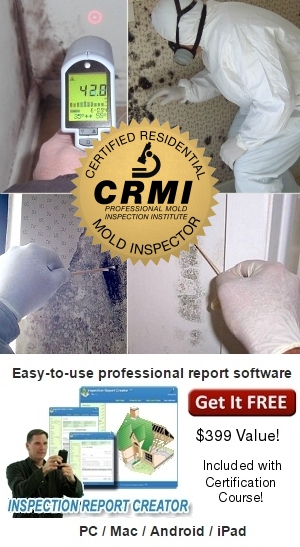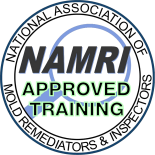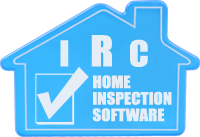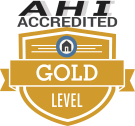Residential Mold Inspector Certification Course
The Certified Residential Mold Inspector (CRMI) course (90 hours) teaches you how to inspect for mold on residential property and write up a mold assessment report for your clients.
Learning Topics:
- How to identify and assess mold intrusion
- How to collect mold samples
- How to recommended remediation protocols
This course is based on the EPA guidelines for mold inspection / mold assessment and gives you a nationally recognized mold inspection certification when you complete the course.
Residential Mold Inspection Course Objectives
Introduction to Mold Inspection Terminology - Overview of the common language used throughout the mold inspection industry by licensed mold inspectorsUnderstanding Mold - Defining mold and its characteristics, how mold grows, the differences between mold, mildew, and fungi, what is considered excessive mold, the causes of mold, defining mold remediation, understanding spores and substrates, potential health hazards, hidden mold, recognizing areas affected by mold, toxic or unsafe mold
Effects on Humans - Harmful effects on humans, how mold attacks, the risks of inhalation exposures, sensitization and allergic reactions, sinusitis, hypersensitivity pneumonitis, and other health problems, by-product reactions, risks of ingestion exposures, techniques for treatment and prevention
Effects on Homes - The cost of mold damage, the cost of mold remediation, molds effects on construction and house furnishings, affects on the insurance industry, construction flaws that cause mold damage, where to look for mold, warning signs of mold
Mold Detection Equipment - How mold can be detected, common tools for mold inspections, where to inspect for mold, mold related safety equipment, common signs & locations of mold infestations
Mold Sampling - Methods of sampling for mold, types of equipment needed, determining the correct mold sampling method, pros and cons of sampling types, tape sampling, swab sampling, bulk sampling, air sampling, safety when sampling for mold
Standards of Practice - The EPA's position on mold exposure, terminology used in mold standards, the scope of a mold inspection and limitations, areas of the grounds, exterior, structure, plumbing, interior, and HVAC which are to be inspected, areas excluded from a mold inspection, standardized procedures for collecting tape, swab and air samples
Grounds Inspection - Components and conditions outside the home and not part of the structure that include grading, slope, erosion, close vegetation, general drainage, retaining walls, and water sources that can contribute to microbial growth in the home
Exterior Inspection - Components and conditions outside the home that are part of or connected to the structure that include porch, decks, patios, steps, siding, windows, window wells, doors, eaves, soffits, gutters, down spouts, flues and chimneys, that have deterioration or defects that can contribute to microbial growth in the home
Structure Inspection - Components that support or allow access to the framework of the home that include the foundation, roof supports, floor and ceiling supports, columns or peers, exterior or load-bearing walls, the attic, basement, crawlspace and garage, that have deterioration or defects that can contribute to microbial growth in the home
Plumbing Inspection - Components and related fixtures that are connected to the home's pressurized water supply, waste pipes and ventilation pipes that include sinks, tubs, showers, drains, toilets and installed appliances such as garbage disposals, dishwashers, washing machines and water heaters that have leaks, deterioration or defects that can contribute to microbial growth in the home
Interior Inspection - Components and conditions inside the home that include windows, doors, kitchens, floor coverings, stairs, bathrooms, laundry, bedrooms, closets and other various rooms that show evidence of suspected microbial growth, water damage, musty odors, dampness, insufficient ventilation, deterioration or defects that can contribute to microbial growth in the home
HVAC Inspection - Components related to the heating, cooling and distribution of a home's climate control system that include the air supply and return boxes, boiler pipe system, humidifier, filters, ducts and vents, condensate drain or pump lines that show evidence of suspected microbial growth, water damage, musty odors, deterioration or defects that can contribute to microbial growth in the home
Mold Reporting - Mold reporting methodologies, pre-inspection agreement, the inspection process, mold report summary, interpreting lab results, reviewing the report with the client
Mold Treatment - Understanding mold remediation, treatment methods, mold remediation techniques, containing mold from spreading, killing and removing mold, protecting a remediated area against mold re-growth

Residential Mold Inspection Course Lessons
- Common Terminology
- Understanding Mold
- Effects on Humans
- Effects on Homes
- Detection Equipment
- Mold Sampling
- Standards of Practice
- Grounds Inspection
- Exterior Inspection
- Structure Inspection
- Plumbing Inspection
- Interior Inspection
- HVAC Inspection
- Mold Reporting
- Mold Treatment

IICRC Institute of Inspection Cleaning and Restoration Certification Approved
PHII's coursework is approved for CEC credits for IICRC, Institute of Inspection, Cleaning, & Restoration Certification. For information call (360) 693-5675. Certification course for residential mold inspection / mold assessment is good for 14 credit hours of CEC from IICRC.

National Association of Mold Remediators / Inspectors Approved
PHII's coursework is approved for initial training hours as well as continuing education for NAMRI, National Association of Mold Remediators & Inspectors. Certification course for residential mold inspection / mold assessment meets the 90 hour training requirement for initial membership in NAMRI
Click the add to cart button below and proceed to the checkout to get signed up. You will be emailed a username/password to login and begin.
Residential Mold Inspector Certification Course is also available through the following offers:











